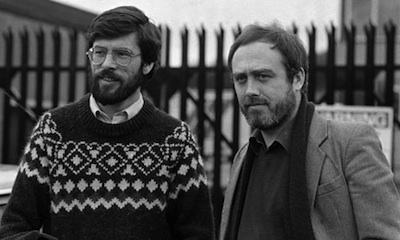
The British government was aware before the 1981 hunger strike that some senior Provisional IRA figures were privately opposed to the use of physical force, according to secret documents found in the papers of Margaret Thatcher.
Official secret memos contained in the archives of the deceased former British Prime Minister reveal that she was told that “some” in the IRA wanted its campaign to stop, and held political ambitions instead.
The revelation in her papers on the 1981 hunger strikes has raised a fresh controversy over the decisions taken by the republican leadership at the time.
In a message sent to Mrs Thatcher on July 6th, at a delicate stage in the hunger strike, the then British Direct Ruler in the north of Ireland confirmed that there were “some” in the IRA leadership who wished “to consider an end of the current terrorist campaign”.
According to the papers, discussions at the time included a potential offer from the British government to settle the hunger strikes in the first week of July, following the deaths of four of the prisoners. However the negotiations failed to secure a deal in time to save the life of the fifth hunger striker to die, IRA Volunteer Joe McDonnell, after which contacts ended. The protest went on to claim the lives of another five prisoners.
At the height of the protest, a memo from the then British cabinet secretary Robert Armstrong stated: “There is reason to believe that the PIRA have been thinking seriously about an end to the campaign of violence, but feel they need a success, an avenue to pursue their aims politically, and something more on the prison regime.
“The Fermanagh by-election has given them the success, and a political opening, which there is reason to think they hope to follow up in the local government elections.”
The release of the memos has renewed claims that a British proposal on prison conditions should have saved the lives of at least five of the hunger strikers. Those claims chiefly by republican author Richard O’Rawe remain strongly contested, most notably by Danny Morrison, who served as a spokesperson for the prisoners before becoming Sinn Fein press officer.
While the documents suggest the British believed that an offer of a deal could have been useful to the more politically-minded republican leaders, O’Rawe and others have controversially claimed an offer was rejected by the Sinn Fein leadership in Belfast so that the hunger strike would continue. The status of the alleged British offer remains the subject of debate and dispute, and it remains unclear if any formal proposal was accepted by the prisoners, as O’Rawe claims.
The hunger strike took place at a time when republicans such as Daithi O Conaill and Ruairi O Bradaigh, viewed as being more militarist, appeared to be in the ascendant within the broad movement although they were under pressure from northern republicans led by Mr Adams, Mr Morrison and the Sinn Fein Deputy First Minister Martin McGuinness.
It is widely accepted that the hunger strikes created the conditions for Sinn Fein to expand politically, and boosted support for the Belfast-based leaders.
It wasn’t until two years later that the northern leadership of Gerry Adams and Martin McGuinness fully took over the (Provisional) republican movement. This month’s Sinn Fein ardfheis marked Mr Adams’s 30th year as Sinn Fein president.
![[Irish Republican News]](https://republican-news.org/graphics/title_gifs/rn.gif)
![[Irish Republican News]](https://republican-news.org/graphics/title_gifs/harp.gif)

